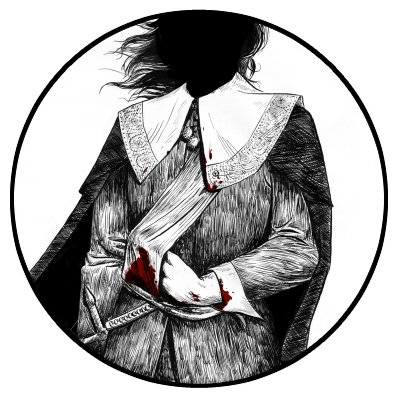This is just a love poem to mynoise.net, really.
I’ve been using myNoise for ages to help with writing. myNoise is a website with well over a hundred customizable sound generators, and it still has the values of the old internet: you do not need to subscribe to the damn thing. You can donate for a few extra perks (it’s worth it) but you do not get roped into some kind of $20-a-month subscription thing. It’s great, the soundscapes are masterpieces, and the site is constantly updated with new ones.
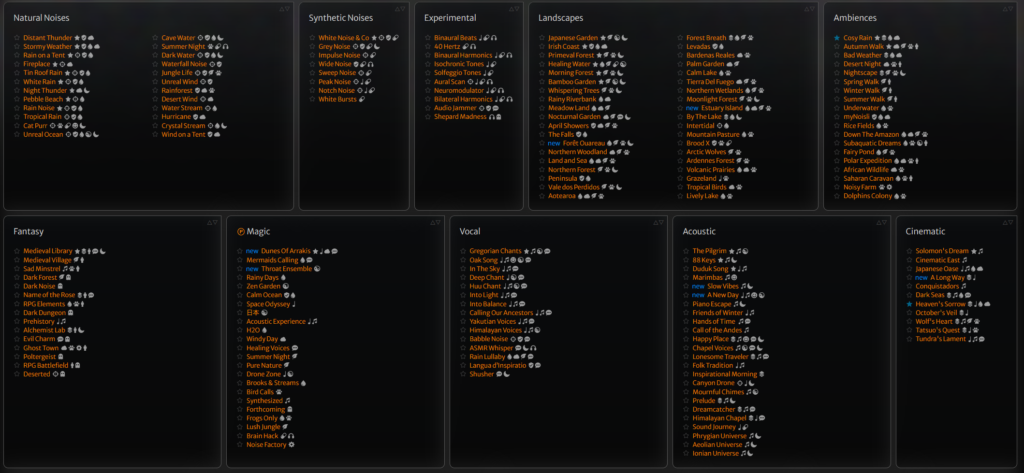
I can’t even fit all the generators in one page.
1. First and foremost: this site has calibration for your own hearing curve.
If you have hearing loss, tinnitus, or just want to make sure you’re getting the most out of what you’re hearing, you can have the site’s sounds adjusted to your hearing range. This feature is not locked behind a donation-wall, but free for everyone to use.
You can access calibration by clicking on the soundscape you want to listen to, and finding the ‘iEQ – Calibration’ on the left hand side.
2. Preset color noises and scenes.
Each soundscape, no matter how simple or complicated, has a selection of presets for color noises (white, pink, and brown) and different scenes. You can use hotkeys to instantly have the soundscape leveled to create white noise, pink noise, or brown noise, all of which have their places in calming or noise blocking. Some generators also offer grey noise in the scene presets.

If that isn’t enough, you can pick from scene presets, which are fantastic especially for writers looking to recreate an exact feeling. Rain Noise gives you: Speech Blocker, Fairy Rain, Bedroom, Under the Porch, Distant Storm, Getting Wet, Only Rumble, Under the Leaves, Dark Rain and Jungle Lodge, all of which use the same 10 sliders to create different proximity/intensity and experience of rain. (There are, like, 5 or 10 rain soundscapes on the site, though, so it doesn’t stop there.)
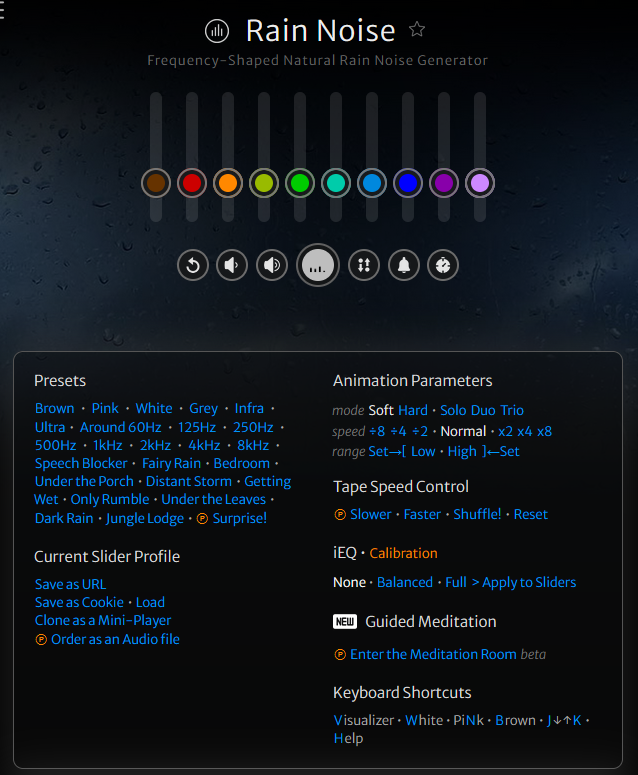
But let’s look at a more complicated one, because myNoise is full of really robust soundscapes.
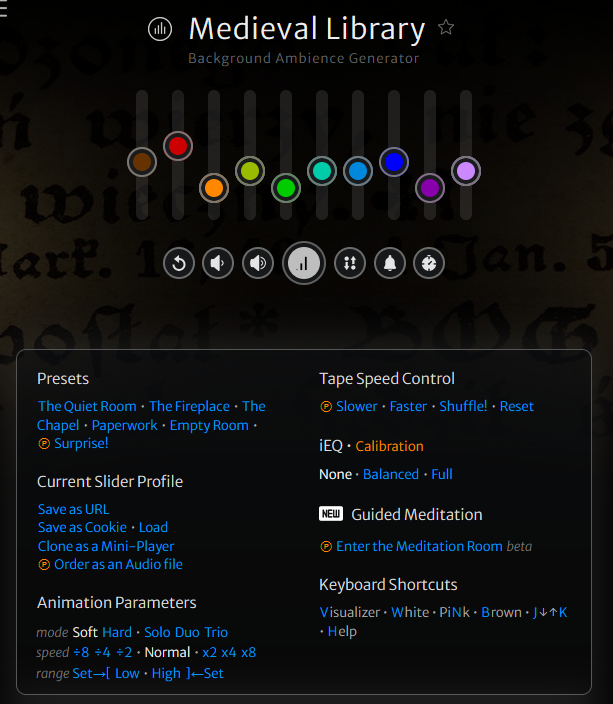
Medieval Library has no noise color presets, but can transport you to: The Quiet Room, The Fireplace, The Chapel, Paperwork, and Empty Room.
Honestly I could be here all day listing generators I like and the presets they offer, it’s really incredible. But there’s more than just scenes…
3. You can adjust all 10 sliders yourself
Say you find a preset you like, but you want more cricket noises. Okay, crank up the cricket 1 slider. Or maybe cricket 1 and 2. You can adjust any soundscape in any way you want to fit your taste, or the scene you’re imagining in your head. Crank up what you want, crank down what you don’t.
4. Animate sliders for more dynamic scenes
You can have the sliders animate slowly or quickly to get a more organic feeling, or just… keep yourself from getting bored of the same exact levels after three fucking hours of writing. Animation is really great for nature landscapes, but it can be especially helpful if, say, you’re writing a character walking around a medieval village. Put the sliders for Medieval Village on animate and the sliders will mimic walking about different parts of a village. The same can be used for wandering around forests, deserted old west ghost towns, haunted houses, or getting a more organic feeling out of a battlefield or trip through deep, dark space.
5. Patrons can create entirely custom generators
If you give myNoise five or ten bucks, even if it was just once, a year ago (but maybe donate more if you use it often), you get access to creating your own generator. You use hot keys to select the sliders you want, then when you’ve got 10 picked, hit the hotkeys for compiling and there you go—a custom set of ten.
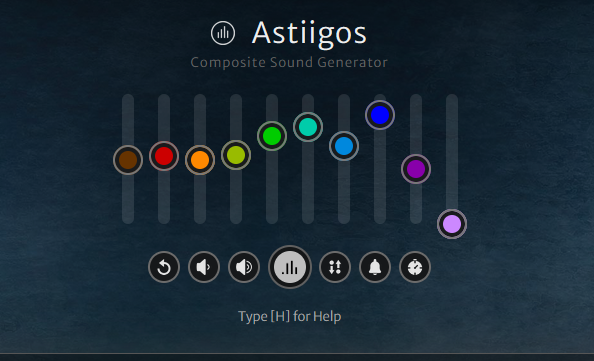
I recently used this to create a specific room for the book I’m writing right now. Three of the super low sliders for a distant ocean, three or four were howling wind, and the rest were mid-highs of a fireplace. This let me get right in there with my characters—distant waves, a howling wind threading through the night, the close pop and crackle of a fire.
This is by no means as crazy as custom generators can get, because you really can put anything you want together. If you’re writing a scene on a futurist submarine that’s haunted and the uh, the main character has a purring cat on their lap and are listening to piano music… I mean you can do that. That’s all on myNoise. The options are truly endless.
You can make utter shit, too: ‘calm office’ meets ‘rpg battlefield’ with the distant, haunting drone of a didgeridoo… a guy listening to a numbers station while in a sauna that’s for, whatever reason, right off of a racetrack. During a race. And the sauna is dealing with a frog infestation. I mean the world is really your oyster here. Get crazy.
So, how do you best use all this shit, especially as a writer?
1. Use it the OG way: block out background noise
You don’t have to use something scene specific. You might just need to try to block out construction noise or a TV in another room. Plugging in your headphones and putting on a certain soundscape might help you get into flow state, too, so you can boost your concentration and signal to your brain that it’s time to work. (Lights low and headphones on are always my go-to for this, though I don’t know how well I have flow state on demand…)
2. Use a soundscape for brainstorming
It’s not always the easiest to transport ourselves into the worlds of our books. Maybe it takes place in a time and place we’ve never been… and if you have to juggle that with plot stuff and character motivation, sometimes stuff can slip through the cracks.
Load up a soundscape that’s similar to the setting of a scene you need to work on, and try to get in touch with how it feels to be there. Again, it might help to turn the lights off and use headphones or earbuds. Close your eyes… what does this feel like? How strong is the wind? What does it smell like? Are there too many people around? Too few? How might the emotions of the scene shed light on how a character interacts with their surroundings? Is this an emotionally difficult scene in a place that feels so wide open, and so lonesome, that the wind sweeping over the grasses makes them feel even more alone? Even more destitute? Is the house creaking and groaning above and beneath them, making them feel like they’re not just in paranormal danger… but physical as well? Does the hum of cicadas remind you that oh, yes, this is a humid, sticky place. The standing water is full of dead bugs, of larvae, and the air is close and hot, even after sunset…
Run through the scene, the dialogue, the beats while listening. Writers with aphantasia might find soundscapes especially helpful, since it relies on evoking a setting without having to visualize anything.
Getting in touch with your setting audibly can really help you anchor your scene and give it an extra feeling of tangibility for the reader, especially if you want the setting to feature prominently. And you might just think of elements to include, and better ways to describe those elements, that you wouldn’t have without experiencing them in the soundscape.
3. The obvious one: use it while writing.
Yup, uh, put the thing on while you’re in the scene. It’s raining, the character is in their bedroom, and you got Bedroom scene of Rain Noise on. Alrighty. A lot of stuff from the point above can come into play here, too. You might just think of something extra to add while listening…
4. The less obvious one: use it for feeling.
So there are some weird, creepy ass generators on myNoise, which is great if you’re writing horror. If you’re easily frightened, I’d say delve into the ones with ghost icons with caution, but scary isn’t the only feeling you can evoke with sound generators. If you know a soundscape makes you feel calm or peaceful, and you’re writing a calm and peaceful scene, slap that bad boy on. If you’re writing a strange altered state, a dreadful foreboding, you might put something like Bell’s Breath or Black Lyra on to get into the weird vibe.
The soundscapes don’t need to be literal in terms of place, but they can be great for feeling. What soundscape makes you feel a certain way though is totally personal—you’ll have to figure out which ones are your go-tos for evoking feeling.
And that’s it!
If you’re interested in incorporating this into your writing routine, give yourself an hour or so before your next writing session to poke around the site and see what you like. Try out calibrating the sounds to your hearing, and then try some of the more basic ones (thunder, rain, fireplace) and figure out what color noise you like the best (I always find brown noise the most calming.) You can use that info later if generators have a color noise setting and if you want it to have the most calming or best noise blocking properties.
Then get weird with it. Give them five or ten bucks and see if you can create custom gens based on scenes in your book. Though, don’t make a whole bunch at once to use later, as I’m unsure at the time of writing this if you can save them, but I’m sure there is a way and I just don’t know what it is. Get stuck in to a good one and hit up pinterest or unsplash–or maybe you already have a folder of reference images—and find visual references for your book and just soak that shit up.
This is, by the way, totally okay to do—you never have to create in a total void. Inspire yourself as much as you can. I mean, I even put on evocative perfume for some projects to really get in the zone. Most of us I think write in places and eras we’ve never lived in and could never go to—so of course it makes sense to try to “visit” with a creepy old soundscape and some sick pictures of castles to look at.
As a final note, too, I’ll just mention that this is a really nice site to have on hand for non-writing work. And just… living. I like Japanese Garden a lot to just have on when I’m feeling a bit low and want some pleasant nature sounds to perk me up. Distant Thunder I play sometimes when sleepless—the site does have an app version (though you have to buy some generators) as well as tracks available on some music streaming platforms. I find a really low, distant rumble of thunder really soothing at night. You might find something that really soothes you, too, and and is completely unrelated to your writing work. That’s cool as hell.
